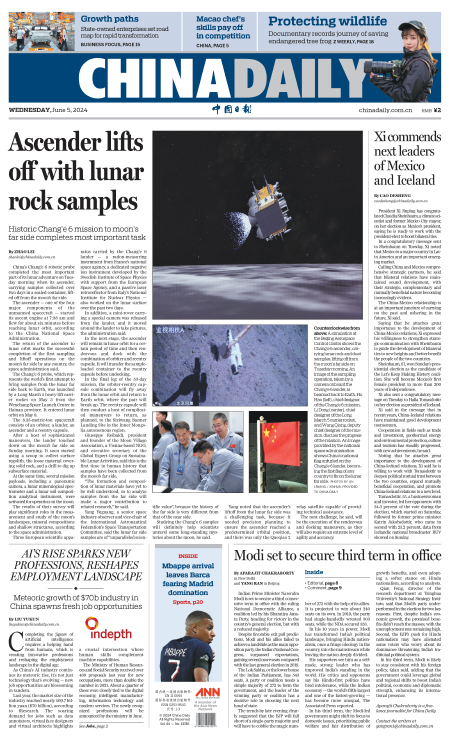Indian Prime Minister Narendra Modi is set to secure a third consecutive term in office with the ruling National Democratic Alliance, a coalition led by his Bharatiya Janata Party, heading for victory in the country's general election, but with a reduced majority.
Despite favorable exit poll predictions, Modi and his allies failed to achieve a landslide as the main opposition party, the Indian National Congress, surpassed expectations, gaining several more seats compared with the last general election in 2019.
The Lok Sabha, or the lower house of the Indian Parliament, has 543 seats. A party or coalition needs a simple majority of 272 to form the government, and the leader of the winning party or coalition has a decisive role in choosing the next head of state.
The trends by late evening clearly suggested that the BJP will fall short of a single-party majority and will have to cobble the magic number of 272 with the help of its allies. It is projected to win about 240 seats on its own. In 2019, the party had single-handedly wrested 303 seats, while the NDA secured 353.
In his 10 years in power, Modi has transformed India's political landscape, bringing Hindu nationalism, once a fringe ideology in the country, into the mainstream while leaving the nation deeply divided.
His supporters see him as a self-made, strong leader who has improved India's standing in the world. His critics and opponents say his Hindu-first politics have bred intolerance, while the Indian economy — the world's fifth-largest and one of the fastest-growing — has become more unequal, The Associated Press reported.
In his third term, the Modi-led government might shift its focus to domestic issues, prioritizing public welfare and fair distribution of growth benefits, and even adopting a softer stance on Hindu nationalism, according to analysts.
Qian Feng, director of the research department at Tsinghua University's National Strategy Institute, said that Modi's party underperformed in the election for two key reasons. First, despite India's economic growth, the promised benefits didn't reach the masses, with the unemployment rate remaining high. Second, the BJP's push for Hindu nationalism may have alienated some voters who worry about its dominance threatening India's traditional political system.
In his third term, Modi is likely to stay consistent with his foreign policy, Qian said, adding that the government could leverage global and regional shifts to boost India's political, economic and diplomatic strength, enhancing its international presence.
Contact the writers at yangran1@chinadaily.com.cn

